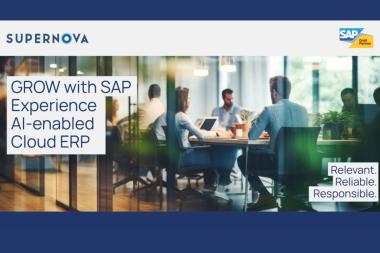Are your ready for your Cloud ERP?
Companies have been implementing ERP [1] (Enterprise Resource Planning) software for more than twenty years. Their ultimate goal – to better manage their resources, on a single platform that integrates business processes and functions including accounting, supply chain, procurement, production, customer services, human resources and corporate governance. According to research groups, small and medium sized enterprises [2] should use below criteria and in the following order when selecting an ERP:
- Implementation partner
- Software vendor
- Business requirements support
- Ease of use and implementation time
- TCO (total cost of ownership)
During the last few of years, cloud ERP is becoming more common than ever before. More companies implement Cloud ERP or some type of cloud deployment. As a result ERP vendors offer different deployment options and have been investing in Cloud rather than the traditional on-premise technologies. This makes the ERP decision making process more complicated because companies not only need to decide which ERP better fits their business but also the deployment method.
The purpose of this article is to help you understand your ERP deployment options during your decision making process. The decision can only be yours.
-
On-premise
This is the traditional model most companies currently still run; especially those that have implemented an ERP system, at least a few years ago. As a company, running your ERP or other business software on-premise, you are solely responsible to maintain the hardware infrastructure and software including below internal and external partners costs:
- Deploy and maintain the hardware infrastructure
- Backups, failover and disaster recovery plans
- Security
- Software updates
That means you have complete control of your on-premise deployment and flexibility to customize your own, not necessarily industry or best practices, processes. More customization results in longer implementation duration, effort and costs. The on-premise deployment approach is not flexible when your company needs to scale the ERP system and hardware infrastructure up or down. Companies are required to invest in upfront high capital expenditure hardware infrastructure, often not fully utilized.
The on-premise option maybe a better fit for larger enterprises that usually have the required resources and relevant expertise to maintain while they run more mature business models with core business processes well defined.
- Hybrid
Hybrid ERP deployment combines on-premise ERP software technology and IaaS [3] (Infrastructure as a Service). IaaS providers such as Amazon AWS, Microsoft Azure and Google manage the servers, hard drives, networking, virtualization, and storage. With this option, your company is still responsible to maintain ERP software and outsource hardware infrastructure, the physical layer.
Running on-premise software technology on a data center or IaaS cloud infrastructure does not make your ERP a true cloud software. When enterprise software vendors or their implementation partners, host legacy, on-premise software on data centers and rebrand it as cloud software, this is called ‘Cloud Washing’ [4].
Often companies using ERP software confuse the Hybrid with Cloud deployment. The latter is only possible with a true cloud software also called native cloud application (NAC), described below.
For companies looking for higher ERP flexibility and lower infrastructure cost, the Hybrid deployment could be the preferred option.
- Cloud
This is a public cloud service[5] , called SaaS (Software as a Service) [6]. Your software vendor offering this service is responsible for the ERP software and physical infrastructure maintenance. A Cloud ERP system may only be categorized as a native cloud application when:
- It is designed specifically for a cloud computing architecture.
- Offered as a service, on-demand
- It comes with regular, usually quarterly, updates that include latest innovations and compliance updates, such as GDPR and IFRS.
- It runs through web browser, offers mobile apps and is platform independent (runs on desktop, tablet or mobile).
- Hosted and managed on the software vendor’s public cloud.
Cloud ERP is offered with subscription-based licensing. That means no need to purchase hardware, minimal up-front investment and predictable costs that can usually be accounted for as an operating expense rather than a capital expenditure.
Cloud software means standardization, enabling your business to implement best practices, streamlined processes across every business function. Growing SMEs can leverage on best practices supported by Cloud ERP with faster adoption to support their business – time to value – as opposed to costly and time-consuming redesign and reinventing activities to organically grow internal business processes.
This makes the Cloud ERP deployment option more attractive for SMEs – that is 99.89% of Cyprus registered entities [7].
Summary
Companies nowadays have different deployment options when it comes to selecting an ERP system according to their company’s size, industry and buying preferences.
Should these be the only selection criteria during your ERP selection and deployment option decision-making process? How about the ability to:
- Interact with your organization in real time from anywhere, anytime and any device with real time analytics?
- Integrate internal business processes across your organization’s borders with external partners or an entire ecosystem through an intelligent data platform?
- Leverage on intelligent technologies such as AI (Artificial Intelligence), ML (Machine Learning) and IoT (Internet of Things) to enable greater productivity and profitability?
If the answer is yes to one or more of the above then your business may be in need for an Intelligent ERP (or Intelligent Enterprise) [8] to transform their business and be fundamentally different. While larger enterprises have implemented some form of cloud intelligent enterprise technologies, if you are running an SME then an intelligent cloud ERP should certainly be considered.
[7]http://www.mof.gov.cy/mof/cystat/statistics.nsf/All/A2963B819A1B7864C22583590036966F/$file/ENTERPRISES_NACE2_SIZE-2017-041218.pdf?OpenElement
[8] https://www.idc.com/getdoc.jsp?containerId=US43262918
Kyriacos Stylianides, Managing Director, Supernova Consulting.











